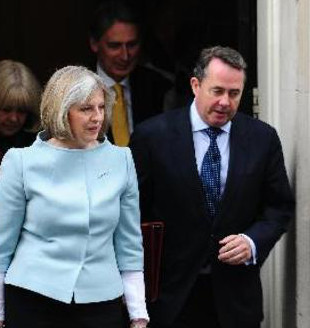| Home> | Industry Sector | >Rail, ports & transport | >No seat for logistics at PM’s Brexit talks table |
| Home> | Distribution | >Transport | >No seat for logistics at PM’s Brexit talks table |
No seat for logistics at PM’s Brexit talks table
20 July 2017
As the Prime Minister meets business leaders at Downing Street today to discuss the potential economic impact of Brexit, the Freight Transport Association has expressed serious dismay that the sector has once again been overlooked in planning for the UK’s exit from the European Union.

“Logistics is the blood supply that keeps the other parts of the economy fit and healthy,” said James Hookham, deputy chief executive of the Freight Transport Association (FTA), which represents more than 16,000 businesses across all sectors of the freight and logistics industry. “When discussing how trading relationships will operate during and after the Brexit process, it is vital that logistics has a seat at the table. Without it, Britain will find it difficult to keep trading effectively.”
“These lifelines for business will be cut off if the needs of the logistics sector are not taken into account when forging new trading arrangements. Our members have legitimate concerns about whether a frictionless trade deal with Europe will be possible in the post-Brexit world, and it is imperative that government takes these issues seriously if Britain is to continue as a leading player in the European, and global, marketplace.”
In particular, FTA is asking government to consider five key areas identified by its members as crucial to the nation’s future trading success:
• Customs systems and procedures need to be in place which are capable of handling up to 300 million additional annual declarations;
• Time needs to be allowed for the sector to adapt to new systems which will be required for UK-EU trade customs declarations – something that has not been required since the UK entered the EU;
• Equivalent procedures need to be introduced in all other European Customs administrations to avoid intra-EU border delays;
• Checks on vehicles need to be avoided at ports and airports, where there is no time and no room: alternative processes need to be introduced swiftly;
• Transitional arrangements must be robust enough to cope with a round-the-clock industry, particularly if negotiations break down at short notice and the UK exits the Customs Union without a deal.
Hookham adds: “We urge the government to include the sector as part of any future trade discussions. Without it, Britain’s trading relationships could grind to a halt.”
- FTA outlines rail freight priorities following Government report
- Logistics UK scathing of Government inaction on Brexit
- Freight must get a share of £500m funding for ultra-low emission vehicles
- Fuel price top operator concern as costs soar to all-time high, says FTA
- DCPC one year on: navel gazing not an option, warns FTA
- Road maintenance is not just a patch up job says FTA
- Van hero recognised
- Still a key issue
- Logistics UK urges action on skills
- FTA welcomes face-to-face with Treasury over fuel duty










/GRABOMATIC LOGO-tn.jpg)
















